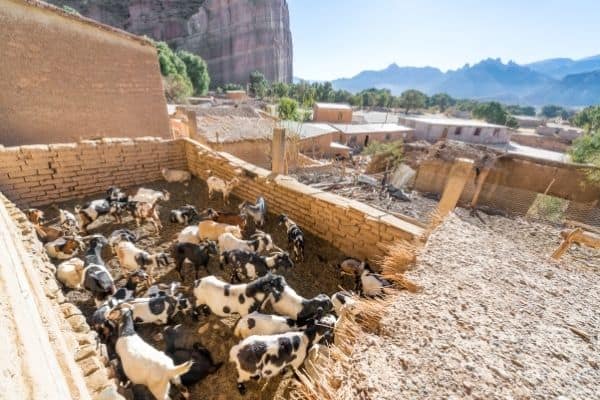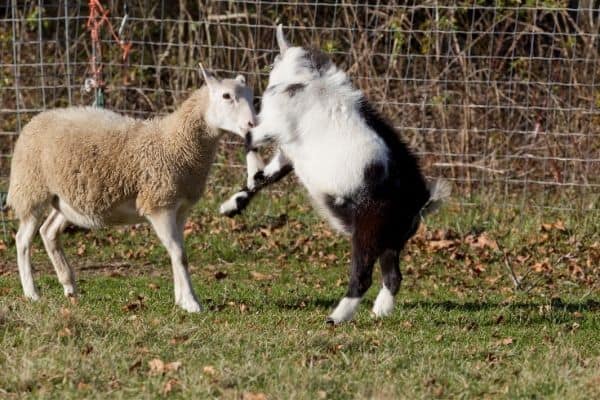Sheep and goats can live together harmoniously provided they are given the correct nutrition and shelter. They have slightly different dietary needs so getting it right is the key, especially when it comes to the all-important mineral, copper. Also, the males of the species need to be disbudded/polled to avoid injuring each other, especially at breeding time.
Let us see some of the key factors you need to consider if you plan to keep sheep and goats together on your farm.
Sheep and Goats have Different Dietary Needs
These two animals have slightly different dietary needs, so if you plan to have sheep and goats live together, this needs to be addressed.
Sheep are natural grazers, which means they like to spend their days happily munching away on grass, clover, and various broad-leaved plants (aka “forb” or “phorb”).
Goats, on the other hand, are browsers, which means they like to eat things at head height, such as shrubs, bushes, and twigs. They will also eat tall, unruly weeds, which can be quite useful if you’re not into gardening.
But all is not lost if the land you are planning to keep them on, does not fulfill the above criteria. Both of these animals can be fed entirely on store-bought feed, BUT there are some very important things you need to know to avoid nutrition imbalance-related health issues.
One of the most important differences between their diets is the amount of copper that these guys need. Goats require similar levels of copper in their diets as cattle, whereas sheep are susceptible to copper, and too much of it can be toxic to them. If left unchecked, it could eventually kill them.
Therefore, it is vital that you either feed these animals separately or make sure you get a specific Sheep; Goat Feed. However, if you do this, you will need to feed your goats a copper bolus, a slow-release copper supplement that can be given in a capsule form.
Signs of copper deficiency in goats are a wiry coat, hair loss, a change in coat color, and anemia, which can be detected by looking at the inside of the lower eyelid. If it is really pale or white, instead of a healthy bright pink, you are most likely dealing with a copper deficiency that must be addressed immediately.
Another option is to give your sheep and goats separate sleeping areas and put their feed in there to control their diets. Whatever way works best for you, just be sure to address this potentially fatal issue.
Always remember that goats do not particularly like to eat from the floor, so if you have to feed them hay, always use a manger or some other form of a holder to keep it raised so they can still satisfy their natural browsing instincts.
What to do About Their Shelter?
This is an important factor in keeping both of these species healthy and happy. While sheep aren’t as bothered by the rain as goats are, they still require adequate shelter.
Many sheep are quite content to shelter under a tree when it rains, but if there aren’t many trees on your land, they will require something that gives them good cover and preferably with three walls.

On the other hand, Goats most definitely need to be provided with good shelter from the elements.
Again, a 3-sided shelter will suffice, but if you live in a climate with lots of rain and wind, that extra wall with a door will be gratefully received and make for better-tempered goats!
Also Read: How Much Space Do Dairy Goats Need
Monitor the Males During Rutting Season
“The rut” is characterized in males by an increase in testosterone. This is when they become sexually active and start to fight with other males to compete for the females’ attention.

This can often lead to an increase in aggression and result in one of your animals being injured. If you are keeping male goats and male sheep together, you need to be aware of this danger.
Better to Do Disbudding
One of the best solutions for sheep and goats to live together safely is to get the horns removed from both animals to avoid serious injury. Failing this, you will have to separate the males from each species at breeding time, and if you have more than one male of each species, you may have to separate them from each other as well.
Another option is to buy “polled” sheep and goats. These are animals that have been bred not to have horns. It is thought that horn growth is controlled by hormones, and there is a ‘poll’ test that can actually identify carriers of the horn gene.
Although disbudding may seem cruel, it is a necessary evil as these little guys can do a lot of damage to each other, as well as their handlers, if they keep those horns. It cannot be denied that this is a painful practice, but it is in the animals' interest and must be done between 2-4 weeks of age.
Relationship Issues
OK, as much as these are both adorable animals to keep on a smallholding, please remember they are different animals. They should never be kept as one breed, so never have one sheep and one goat. They are herd animals and have their own languages, and as such, need to have same-species companions.
Even if kept together, you will see that the sheep stick with the sheep and the goats stick with the other goats. It has also been observed that goats can be bullies to sheep, so this is something you may need to keep an eye open for.
Diseases
Keeping Sheep and Goats together will increase the spread of disease between the species. They share common diseases such as orf, ringworm, Q fever, chlamydiosis, leptospirosis, campylobacterosis, salmonellosis, listeriosis, cryptosporidiosis, and giardiasis.
Having said this, if you maintain good hygiene, husbandry, and parasite control of your animals, this shouldn’t be too much of a problem. It is also essential to make sure that you buy healthy animals to start with, as this will minimize the risk of parasite problems and infection.
Conclusion
A lot of smallholders naturally gravitate towards keeping small livestock together, such as sheep and goats. Whether it be for milk, meat, or both, it is important to do the research and make sure you are fully aware of the responsibility you are taking on.
These are both wonderful creatures to keep and to ensure that sheep and goats live together happily, you must provide the correct essentials for them. After all, a healthy animal is a happy animal, and this equals a happy handler.
